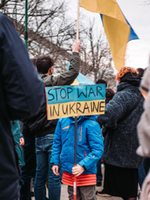Filter by...
Reset all
Publications (71)
Blog
Russia’s war in Ukraine may reach a stalemate as neither side appears in reach of a military victory. Unless a settlement can be agreed, a frozen conflict may emerge, which will delay economic recovery in Ukraine. This will also extend the cost of living crisis around the world. In February 2022...

The current and future civilian impacts of the war in Ukraine are immense. This column argues that the levels of vulnerability and resistance of civilians in wartime depend on three factors: the nature of violence during the war causing economic, psychological, and social disruption; the...

The price and availability of energy is fundamental to the health of the global economy. The Russia–Ukraine war is intensifying an energy shock that began unfolding as the prices for oil, natural gas and coal started to recover from a COVID-19-induced slump. Energy importers among the low-income...

Russia’s invasion of Ukraine has led to the disruption, by sanctions or war, of two of the world’s largest grain exporters. This means 2022 is shaping up to be a very difficult year for the global food system. Yet there were concerns that this system was creaking at the seams as far back as 2007. At...

Russia’s invasion of Ukraine has rightly stirred outrage against an act of naked aggression, and sympathy for the plight of ordinary Ukrainians forced to flee their homes and to become refugees. I offer five insights from political science on what the crisis may bring. Pax Americana and the Liberal...

– From comedian to national hero
Shock over the Russian invasion of Ukraine on 24 February 2022 continues to be felt. The heroic behaviour of Ukrainian President Volodymyr Zelenskiy, from the first days of the invasion, has been equally surprising and inspiring for everyone observing the developments in Ukraine. Zelenskiy, a former...

– European Peace Facility, Ukraine, and the evolution of EU’s role
Russia’s war of aggression on Ukraine has catalysed the European Union (EU) — criticised as a paper tiger yet acknowledged to evolve through crises — to take concrete steps in security and defence action. The new European Peace Facility (EPF) will now be used to finance lethal equipment for the...

– A political violence perspective
The Russian invasion of Ukraine has been fast shifting into a new phase, one many observers have noted is marked by increasing levels of Russian brutality and harm toward Ukraine’s population. Reports of Russian bombing of civilian targets are making headlines around the world, and tragically the...

– What the new Cold War means for global cooperation
Last week we woke up to a conflict that had echoes of the Second World War, the Cold War, and the last two decades of hybrid conflict all mixed into one. It is difficult to look beyond the immediate suffering and scale of violations in Ukraine. Yet one important take-away so far from the means of...

– What recent history of Abkhazia tells us about the future of Donetsk and Luhansk
The recognition of disputed territories as independent states rarely brings underlying conflicts to an end. Instead, fully, and partially, recognized states established on the back of separatist wars face war recurrence, protracted violence just short of war, and what is commonly referred to as...

– External support and insurgency tactics
The Ukrainian state, personified by its President Volodymyr Zelenskyy, has been heroic and has surprised many by its 'stiff resistance'. However, Ukrainian cities are increasingly under siege and Russia is sending in reinforcements. Just days into the invasion, Russia is ramping up the bombing of...
Working Paper
pdf
– The case of BRICS
As the world battles with the triple problems of social, economic, and environmental challenges, it has become important to focus both policy and research efforts on these. Therefore, this study examines the effect of wealth inequality on CO2 emissions in five emerging economies: Brazil, Russia...
Blog
– The Role of Inequality and Institutions
27 August 2014 Vladimir Popov Modern economic growth started in the West, not because of the efficiency of various capitalist institutions (elimination of serfdom, free cities, universities). It was the redistribution of wealth and income (enclosure in Britain) that resulted in an increase in...
Blog
Alisa DiCaprio The global arms trade is a lucrative business. In 2010, total arms transfers were estimated at US$40 billion. Despite the global recession, top producers in this highly concentrated industry continued to see a sales increase. Since 2002, global sales have grown by 60 per cent. But it...
Displaying 16 of 71 results
 Join the network
Join the network